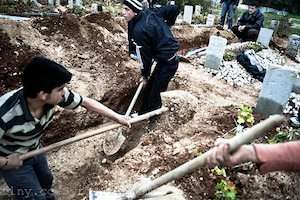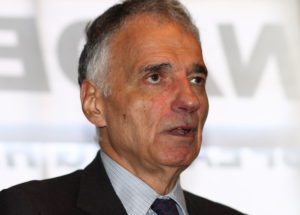‘Syria May Survive but Many Syrians Will Not’
In a sad farewell note to the country he spent a long time covering, reporter Patrick Cockburn describes how ordinary Syrians struggle to survive amid a seemingly interminable civil war stoked by foreign governments pursuing their own interests.
In a sad farewell note to the country he spent a long time covering, reporter Patrick Cockburn describes how ordinary Syrians struggle to survive amid a seemingly interminable civil war stoked by foreign governments pursuing their own interests.
The Independent’s Cockburn writes Wednesday of vendors and merchants whose sales dried up because of the difficulty collecting and transporting food and other goods (“business is bad and our customers are few,” one shopkeeper says). Prices have skyrocketed. The value of the Syrian pound has dropped precipitously. Fighting has squelched oil exports. Agriculture is “crippled,” and tourism has vanished.
Former Syrian Planning Minister Abdullah al-Dardari estimates the total damage to the economy at $60 billion to $80 billion — roughly a third of the prewar economy.
“How do Syrians survive the burdens of civil war?” Cockburn asks. “The answer is that many of them do not.”
“In a school in Homs,” he writes, “I met an 85-year-old man called Awad al-Izou who is a refugee from Baba Amr district whose house — ‘it had seven rooms’ he recalls — in that former rebel-held bastion has been destroyed. ‘I had five sons, one of them martyred, two in prison [one in Damascus, the other in Homs], one disappeared and one living in a distant village.’ He lives in a government-run refugee shelter in a school because ‘at least here I have a bed, food and electricity.'”
“Syria may survive but many Syrians will not,” Cockburn continues. “Unicef says that 6.2 million Syrians, out of a population of 23 million, are in need of direct assistance. Half of them are children. The plight of refugees fleeing to Lebanon, Turkey and Jordan gets international attention but the 4.25 million displaced inside Syria are less visible. In Homs alone, 400,000 people have fled the Old City and in Damascus whole families are often crammed into a single room.”
— Posted by Alexander Reed Kelly.
Your support matters…Patrick Cockburn:
Most dispiriting for Syrians is not just that life is hard and getting harder, but they do not see why it should get any better.
Syria is facing a conflict akin to the Lebanese civil war that lasted 15 years. A diplomat in Damascus said “both government and opposition think they can win. That is why the war is going to go on a long time.”
And a long war leads to irreversible losses such as a sustained lack of confidence in the economic future, emigration of the best educated and a damaged infrastructure. Even if the civil war ends tomorrow – which it will not – Syria will be a crippled society and economy for years to come.
Independent journalism is under threat and overshadowed by heavily funded mainstream media.
You can help level the playing field. Become a member.
Your tax-deductible contribution keeps us digging beneath the headlines to give you thought-provoking, investigative reporting and analysis that unearths what's really happening- without compromise.
Give today to support our courageous, independent journalists.






You need to be a supporter to comment.
There are currently no responses to this article.
Be the first to respond.